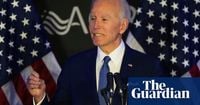In a recent interview on Fox Noticias, former President Donald Trump shared his views on the role of Jill Biden in the Biden administration, sparking conversations around her influence and the overall health of President Joe Biden. When asked by host Rachel Campos-Duffy if he believed Jill Biden was merely Joe Biden's "autopen," Trump responded, "No, I don't think so," but quickly added that she was "certainly involved" in the administration's activities. He referenced her attendance at one of Biden's last Cabinet meetings in September 2024, suggesting that it indicated her significant involvement.
Trump’s remarks come amid ongoing debates about Joe Biden's cognitive abilities and health, which have been scrutinized throughout his presidency, notably after his performance in debates against Trump last summer. Trump attributed Biden's alleged influence to what he called "radical left lunatics" within the administration, stating, "They had a lot of bad people. They had a lot of radical left lunatics in there, and I think he was perfect. He was perfect for them because he didn't have a clue." This characterization of Biden's leadership has been a recurring theme in Trump's narrative against the current administration.
On the other hand, Joe Biden, in his first public address since leaving the White House, took aim at Trump and tech mogul Elon Musk, accusing them of undermining social security, a program he described as a "sacred promise" to the 73 million Americans who rely on it each month. Speaking to the Advocates, Counselors, and Representatives for the Disabled in Chicago on April 16, 2025, Biden expressed his concerns over the recent cost-cutting initiatives proposed by Musk, which he claimed would have profound psychological impacts on those dependent on social security. "In fewer than 100 days, this new administration has done so much damage and so much destruction," Biden said, highlighting the potential changes to a system that has been a safety net for Americans for nearly a century.
Biden further emphasized the historical significance of social security, noting, "In the 90 years since Franklin Roosevelt created the social security system, people have always gotten their social security checks. They’ve gotten them during wartime, during recessions, during a pandemic. No matter what, they got them. But now for the first time ever, that might change. It’d be a calamity for millions of families." This speech underscores the ongoing tensions between the Biden and Trump administrations, particularly concerning social welfare programs.
Meanwhile, as the political landscape continues to shift, the humanitarian crisis in Sudan has reached alarming levels. On April 15, 2025, attempts to establish a contact group for ceasefire talks in Sudan collapsed after Arab states refused to sign a joint communique following a conference in London. This setback comes as the civil war in Sudan marks its two-year anniversary, with tens of thousands of casualties reported. The International Rescue Committee has called it "the biggest humanitarian crisis ever recorded," with nearly 13 million people displaced and about 24.6 million facing food insecurity.
The ongoing violence has led to a dire situation for the 51 million people in Sudan, with many fleeing to neighboring countries. The lack of a cohesive diplomatic effort to address the crisis raises concerns about the future stability of the region. The leader of the paramilitary Rapid Support Forces, Mohamed Hamdan Dagalo, known as Hemedti, has further complicated the situation by declaring the establishment of a rival government, escalating tensions within the country.
In another part of the world, the humanitarian crisis in Gaza has intensified following an Israeli missile strike on a hospital on April 15, 2025, which resulted in one death and several injuries. This attack coincided with Israeli Prime Minister Benjamin Netanyahu's visit to the region, raising alarms about the escalating violence. The United Nations has voiced deep concern over the attacks on medical facilities, with Secretary-General António Guterres stating that hospitals are protected under international humanitarian law. The UN office for the coordination of humanitarian affairs has reported that the situation in Gaza is likely the worst it has been since the onset of full-scale war in October 2023.
As the conflict continues, Israel has maintained a blockade on the Gaza Strip for over six weeks, cutting off supplies to the 2.3 million residents. Medical professionals warn that if the blockade persists, patients with severe illnesses, including cancer and kidney disease, may not survive without necessary medical supplies. This dire situation highlights the urgent need for humanitarian aid and international intervention.
Back in the United States, the financial struggles of X, formerly known as Twitter, have come to light, revealing a staggering 66.3% drop in UK revenue from £205.3 million in 2022 to £69.1 million in 2023. The company attributed this decline to reduced advertising spending amid growing concerns about brand safety and content moderation. This financial downturn reflects broader challenges faced by social media platforms in maintaining user engagement and advertiser confidence.
In the arts, painter David Salle has made headlines for incorporating machine-learning software into his creative process. His latest work, titled New Pastorals, showcases the intersection of traditional painting techniques and modern technology, raising questions about the future of art in an increasingly digital world.
As the news cycle continues to unfold, the latest developments in politics, humanitarian crises, and cultural innovations remind us of the complexities and challenges facing our global community. With leaders like Trump and Biden shaping the narrative, the stakes remain high for both domestic and international issues that affect millions.





